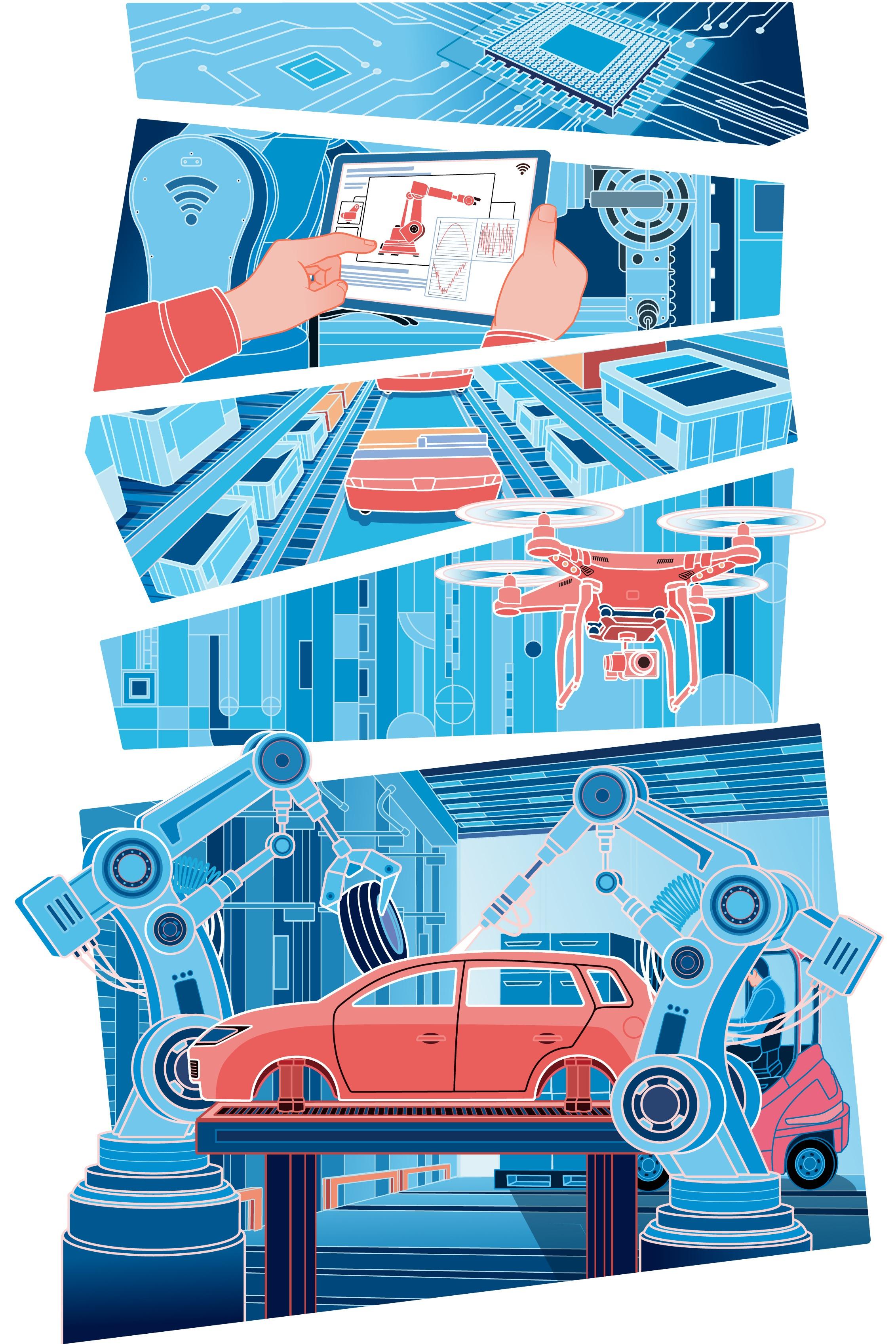Meeting calls for efforts to mobilize enthusiasm of business entities
 (SHI YU / CHINA DAILY)
(SHI YU / CHINA DAILY)
China recently rolled out a raft of policy measures to advance new industrialization and fully enhance the quality, efficiency and global competitiveness of its industrial development, which experts and executives said will facilitate the country's technological advancement and sustainable growth.
Such initiatives will also promote the upgrading and optimization of existing industries, strengthen the resilience and security of the nation's industrial and supply chains and foster new drivers of economic growth in the long run, they added.
In late September, a State Council Executive Meeting introduced the measures to push new industrialization at a faster pace, so that central authorities can keep up with the shifting dynamics at home and abroad and the new development stage of China's industrialization.
The quality of industrial development determines the speed, efficiency and level of a country's modernization, said Cheng Nan, director of the planning institute at the China Center for Information Industry Development, a think tank in Beijing.
China's industrial output — a gauge of activities in the manufacturing, mining and utilities sectors — grew by 4.5 percent year-on-year in August, with the growth rate accelerating by 0.8 percentage point compared with the previous month, data from the National Bureau of Statistics showed.
The high-end manufacturing sector, in particular, continued to grow at a good clip, as the industrial output last month in integrated circuits and optoelectronic devices surged 21.1 percent and 29.9 percent year-on-year, respectively, according to the NBS.
China is embracing enormous prospects offered by the latest round of the scientific and technological revolution and industrial changes, but the nation is also dealing with growing uncertainty and instability brought on by the challenging and intricate international landscape, Cheng said.
Against this backdrop, China must take resolute steps to strengthen its manufacturing sector and boost its real economy, as well as accelerate the promotion of new industrialization, Cheng added.
China has been the world's top manufacturing nation for 13 years in a row, accounting for about 30 percent of global manufacturing production in 2022, according to the Ministry of Industry and Information Technology.
The meeting emphasized the need to push the transformation and upgrading of traditional industries while cultivating strategic emerging ones, accelerating the development of advanced manufacturing industries, and promoting digital industrialization and industrial digitalization in a coordinated way.
The key to accelerating new industrialization is to promote the adoption of digital technologies, such as big data analytics, cloud computing and the internet of things, to enable smart manufacturing, predictive maintenance and data-driven decision-making, said Luo Zhongwei, a researcher at the Chinese Academy of Social Sciences' Institute of Industrial Economics.
These efforts will greatly drive efficiency, productivity and connectivity in new industrialization, Luo said, adding that governments at all levels should invest more heavily in advanced manufacturing infrastructure, including smart factories, industrial parks, research and development centers and digital connectivity.
China will see 70 percent of its major manufacturing firms basically digitalized, and build more than 500 industry-leading smart-manufacturing demonstration plants by 2025, according to a development plan jointly issued by the Ministry of Industry and Information Technology and other departments.
In the midst of mounting downward economic pressure, greater efforts should be channeled to cultivate strategic emerging industries such as biotechnology, new energy, high-end equipment manufacturing and the green industry in order to foster new growth drivers, said Xu Hongcai, deputy director of the China Association of Policy Science's Economic Policy Committee in Beijing.
So far, 45 national advanced manufacturing clusters have been fostered in emerging fields such as new-generation information technology, high-end equipment, new materials and new energy, with the total output of the leading industries 20 trillion yuan ($2.74 trillion), according to the ministry.
In addition, scaling up research and development spending should remain high on the nation's pursuit of new industrialization, as more investment in this regard will enable the exploration of new frontiers in science and technology, leading to breakthroughs and advancements that can transform industries and create new market opportunities, Xu added.
China spent about 3.08 trillion yuan in 2022 on research and development, an increase of 10.1 percent year-on-year. The figure accounted for 2.54 percent of China's GDP, up 0.11 percentage point from the previous year, data from the NBS showed.
Meanwhile, new industrialization has promoted the adoption of clean and energy-efficient technologies. Businesses are encouraged to invest in renewable energy sources, energy-efficient equipment and low-carbon production processes, said Zhu Minghao, executive director of the high-end manufacturing research center at Beijing Jiaotong University.
As a result, new industrialization will not only promote environmental sustainability but also enhance the long-term viability and competitiveness of industries, leading to a more balanced and sustainable approach to high-quality growth, Zhu added.
The meeting also called for dedicated efforts to mobilize the enthusiasm of all types of business entities and use domestic and international markets and resources to inject vitality into the new industrialization.
Fu Baozong, director of the industry department of the Academy of Macroeconomic Research in Beijing — part of the National Development and Reform Commission, the country's top economic regulator — said to forge ahead with the new industrialization plan, authorities must broaden their perspectives and coordinate their efforts across the country.
Stronger support will be provided to foster the collaborative growth of large, medium-sized and small businesses to widen access to foreign investment and to further stimulate the vitality of the private economy, Fu said, adding that China should also create platforms and incentives to facilitate collaboration, joint ventures and strategic alliances, promoting the sharing of expertise, resources and best practices.
In addition, establishing a policy environment that encourages innovation, entrepreneurship and investment is critical, said Yu Kai, founder and CEO of Chinese chipmaker Horizon Robotics.
More favorable policies that foster a vibrant startup ecosystem, such as tax incentives, funding mechanisms and streamlined administrative procedures, should be introduced to stimulate innovation and entrepreneurship, Yu added.


